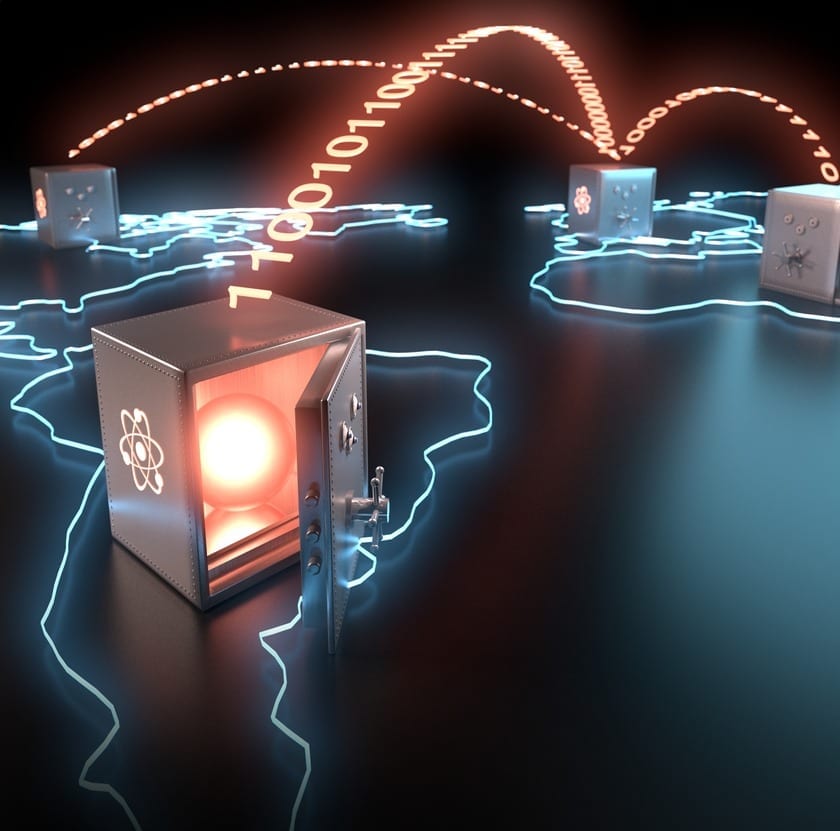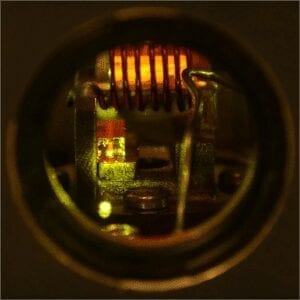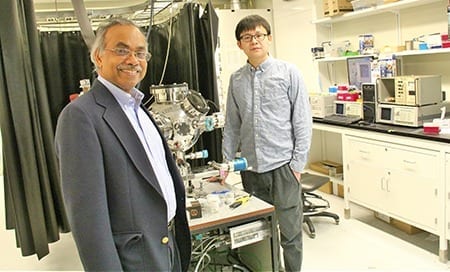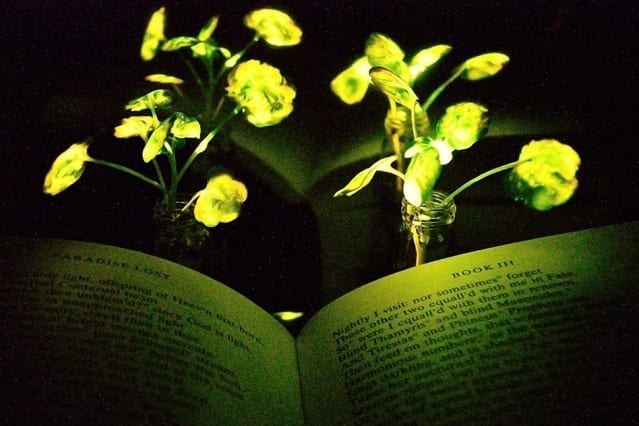
Graphic: Christoph Hohmann, Nanosystems Initiative Munich (NIM)
MPQ scientists achieve long storage times for photonic quantum bits which break the lower bound for direct teleportation in a global quantum network.
Concerning the development of quantum memories for the realization of global quantum networks, scientists of the Quantum Dynamics Division led by Professor Gerhard Rempe at the Max Planck Institute of Quantum Optics have now achieved a major breakthrough: they demonstrated the long-lived storage of a photonic qubit on a single atom trapped in an optical resonator. The coherence time of the stored quantum bit outlasts 100 milliseconds and therefore matches the requirement for the creation of a global quantum network in which qubits are directly teleported between end nodes. “The coherence times that we achieve represent an improvement by two orders of magnitude compared to the current state-of-the-art”, says Professor Rempe. (Nature Photonics, 11 December 2017).
Light is an ideal carrier for quantum information encoded on single photons, but transfer over long distances is inefficient and unreliable due to losses. Direct teleportation between the end nodes of a network can be utilized to prevent the loss of precious quantum bits. First, remote entanglement has to be created between the nodes; then, a suitable measurement on the sender side triggers the “spooky action at a distance”, i.e. the instantaneous transport of the qubit to the receiver’s node. However, the quantum bit may be rotated when it reaches the receiver and hence has to be reverted. To this end, the necessary information has to be classically communicated from sender to receiver. This takes a certain amount of time, during which the qubit has to be preserved at the receiver. Considering two network nodes at the most distant places on earth, this corresponds to a time span of 66 milliseconds.
In 2011, Professor Rempe’s group has demonstrated a successful technique for storing a photonic quantum bit on a single atom. The atom is placed in the centre of an optical cavity which is formed by two high-finesse mirrors and hold in place by standing light waves. A single photon which carries the quantum bit in a coherent superposition of two polarization states starts to strongly interact with the single atom once it is sent into the resonator. Ultimately, the photon is absorbed by the atom and the quantum bit is transferred into a coherent superposition of two atomic states. The challenge is to maintain the atomic superposition as long as possible. In former experiments, the storage time was limited to a few hundreds of microseconds.
“The major problem for storing quantum bits is the phenomenon of dephasing,” explains Stefan Langenfeld, a doctoral candidate at the experiment. “Characteristic of a quantum bit is the relative phase of the wave functions of the atomic states that are coherently superimposed. Unfortunately, in real-world experiments, this phase relation is lost over time mostly due to interaction with fluctuating ambient magnetic fields.”
In their current experiment, the scientists take new measures to counteract the impact of those fluctuations. Once the information is transferred from the photon to the atom, the population of one atomic state is coherently transferred to another state. This is done by using a pair of laser beams to induce a Raman transition. In this new configuration, the stored qubit is 500 times less sensitive to magnetic field fluctuations.
Before the retrieval of the stored photonic quantum bit, the Raman transition is reversed. For a storage time of 10 milliseconds, the overlap of the stored photon with the retrieved photon is about 90%. This means, that the mere transfer of the atomic qubit to a less sensitive state configuration extends the coherence time by a factor of 10. Another factor of 10 was gained by adding a so-called “spin echo” to the experimental sequence. Here, the population of the two atomic states used for storage is swapped in the middle of the storage time. “The new technique allows us to preserve the quantum nature of the stored bit for more than 100 milliseconds”, says Matthias Körber, a doctoral candidate at the experiment. “Although an envisioned global quantum network which allows for secure and reliable transport of quantum information still demands a lot of research, the long-lived storage of quantum bits is one of the key technologies and we believe that the current improvements will bring us a significant step closer to its realization.” Olivia Meyer-Streng
Learn more: Long-lived storage of a photonic qubit for worldwide teleportation
The Latest on: Global quantum network
[google_news title=”” keyword=”global quantum network” num_posts=”10″ blurb_length=”0″ show_thumb=”left”]- Quantum Cryptography market is projected to grow at a CAGR of 29.3% by 2034: Visiongainon April 26, 2024 at 6:22 am
Visiongain has published a new report entitled Quantum Cryptography Market Report 2024-2034: Forecasts by Component (Software, Hardware), by Software (Encryption Algorithms, Key Management Solutions, ...
- China launches 504-qubit quantum chip, open to global userson April 25, 2024 at 9:21 am
The Center for Excellence in Quantum Information and Quantum Physics under the Chinese Academy of Sciences CAS has delivered a 504-qubit superconduc ...
- IBM tops quantum-safe networking rankingon April 24, 2024 at 5:00 pm
As the quantum computing era approaches, network operators will need to consider how to revise ... So earlier this month we asked individuals from across the global telecom sector to complete a short ...
- Vietnam Enterprise Quantum Computing Market Maximizing the ROI of Market Research Strategies for Data-Driven Decision Makingon April 24, 2024 at 3:56 pm
Report Ocean’s latest analysis delves into the “Vietnam Enterprise Quantum Computing Market” Report from 2024 to 2032, covering an array of market facets such as characteristics, size, growth, ...
- Satellite Applications Catapult trials Arqit Network Secure™on April 24, 2024 at 6:00 am
Arqit Quantum Inc. (Nasdaq: ARQQ, ARQQW) (Arqit), a leader in quantum-safe encryption, today announced the successful trial deployment of Arqit’s Network Secure product by the Satellite Applications ...
- Why Banks Should be Taking Quantum Security Very Seriouslyon April 23, 2024 at 5:00 pm
Hackers can exploit encryption ‘backdoors’ and weak points to access sensitive information into the broader network ... cryptographically relevant quantum threat can undermine this and eclipse the ...
- Quantum Communication Breakthrough: Combatting Disruptive ‘Noise’on April 19, 2024 at 7:34 pm
In a significant milestone for quantum communication technology, an experiment has demonstrated how networks can be leveraged to combat disruptive ‘noise’ in quantum communications. The international ...
- In a global first, scientists create, store, and retrieve quantum dataon April 17, 2024 at 10:16 am
This is why scientists have been looking for ways to divide the network into smaller segments and link them up to share the same quantum state. Transmitting quantum information. M ...
- Global Topological Quantum Computing Market Size To Exceed USD 12.52 Billion By 2033 | CAGR of 21.4%on April 17, 2024 at 4:30 am
The Global Topological Quantum Computing Market Size was Valued at USD 1.80 Billion in 2023 and the Worldwide Topological Quantum Computing Market Size is Expected to Reach USD 12.52 Billion by 2033, ...
- Crucial connection for 'quantum internet' made for the first timeon April 16, 2024 at 8:37 am
Researchers have produced, stored, and retrieved quantum information for the first time, a critical step in quantum networking.
via Google News and Bing News










